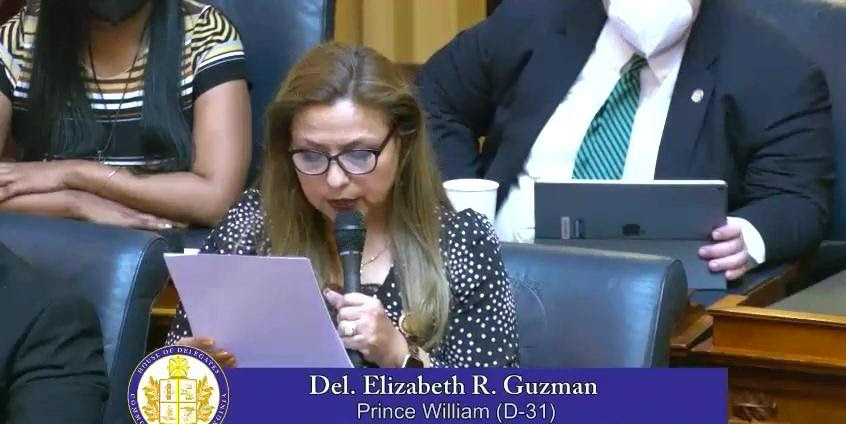Good stuff by Del. Elizabeth Guzman!
|
FLOOR SPEECH: Delegate Guzman Honors St. Martin de Porres, Discusses Threat to Black History in Virginia
|
 |
| In case you missed it, Delegate Elizabeth Guzman (D-Prince William) yesterday delivered the following floor speech in honor of Black History Month:
“Thank You, Mr. Speaker. I rise during this Black History Month to honor St. Martin de Porres, the first Black saint in the western hemisphere. “St. Martin was born in 1579 in my home country of Peru. He was abandoned by his father, a Spanish nobleman, and grew up in poverty. His mother, a formerly-enslaved woman of African and indigenous descent, sent him to live with a barber and surgeon to learn the practice of medicine when she could no longer afford to support him by doing laundry. “St. Martin was deeply religious, but under Peruvian law could not become a full member of the religious order because he was Black. However, he was taken in by a monastery because he agreed to do kitchen work, laundry and cleaning in exchange for the privilege of wearing the religious habit. After eight years in the monastery, the prior turned a blind eye to the law and invited Martin to take his vows, and even as other men in the monastery called him racial epithets. “St. Martin served the poor and the sick in his community, even inviting them into his own bed and into the home of his sister. He became known for healing others, and when an epidemic hit his monastery, he passed through locked doors to care for the ill who were isolated. He established an orphanage and a children’s hospital and even an animal shelter for stray cats and dogs. “St. Martin is the patron saint of barbers, public health workers, people of mixed race, and people seeking racial harmony. The jazz musician Mary Lou Williams pays tribute to him in her album Black Christ of the Andes. He’s also widely celebrated in Afro-Caribbean culture. “St. Martin helped inspire my career in social work and social justice. But as I was writing this speech for Black History Month, I realized that it’s not enough to simply speak nice words about historic figures in Black history when Black history itself is under threat. “This administration and my colleagues across the aisle want to take so-called divisive topics out of our schools and even passed legislation to do so. But St. Martin himself would have been seen as divisive by many of his contemporaries. It was against the law for him to take his vows, but he did, even as his colleagues in the convent called him racial slurs. He was criticized for taking a sick beggar into his own bed, but responded ‘compassion is preferable to cleanliness’. He was reprimanded for taking an indigenous man who was bleeding from a dagger wound into his room, but he shot back that obedience should not take precedence over charity. “St. Martin found his way into a position of privilege and he used that position to care for and advocate for people who were struggling with sickness and poverty. He saw them. He recognized their struggle. And so it is fitting that he is the patron saint of people seeking racial harmony. “And if we are going to ever reach racial harmony here in Virginia, the former capital of the Confederacy, then we need to start by acknowledging the systemic racism that Black communities confront in every aspect of their lives. We will not let you succeed in erasing history from our schools and even if you do, your children will grow up and they will still see the disparities. And they will decide to either further perpetuate those injustices or to correct them. “But this chamber has chosen to perpetuate injustice this session. We perpetuated injustice by passing a bill to keep wages low even as gas and grocery prices rise. Virginia is struggling. How are we helping by freezing the minimum wage? We perpetuated injustice by passing a bill to silence our public service workers by taking away their voice on the job. Economic justice is racial justice, Mr. Speaker. And all of these things are connected. “We know these bills are going to die in the Senate, but have chosen to send them there anyway. And I don’t understand that. Everyone in this room has to run for election every two years. So why would you roll back progress that has helped your constituents, including African-American Virginians? “If we are going to reach real racial harmony, then we should take a lesson from those that St. Martin left us nearly 500 years ago. Martin could have cloistered himself in that monastery, he could have refused to see what was happening outside of it, but instead he chose to serve the most marginalized people in his community. He chose to acknowledge the dignity of every living being and that begins with honoring their experiences, which might be different from our own. “The struggles that St. Martin de Porres faced were not erased from Peruvian history, are still taught nowadays, but etched into it, and Peru has come a long way in the last 400 years to improve race relations. And while I am blessed to be in a country where I was able to achieve higher education and form a family, America and Virginia cannot wait any longer to achieve racial justice. It is on us to acknowledge the struggle that our Black brothers and sisters have faced in this country because Black Lives Matter and so do Black livelihoods. “Numbers don’t lie. Black communities did not choose to die of COVID at higher rates. It is the system that has put barriers to accessing health care. Black families did not choose to own only four percent of the wealth in this country. The lack of intergenerational wealth is a legacy of slavery, discrimination and red-lining. We have to recognize that our nation’s history of racism is real and has driven systemic inequities in every facet of life, from education and employment to health care and housing. But to change it, we first must name it. Because building a bright future for Black Virginians begins with shining a light on our past. Thank you, Mr. Speaker.” ###
|
| Delegate Elizabeth Guzman is a social worker, public administrator, and second-generation union member who represents the 31st District in the House of Delegates, which includes parts of Prince William and Fauquier Counties.
Delegate Guzman holds a master’s degree in social work and a second master’s degree in public administration. As a division chief for the City of Alexandria’s Dept. of Adult Services, she oversees a $20 million budget for a 200-person operations staff serving some of our most marginalized populations, including our seniors and people struggling with substance use disorders. Delegate Guzman and her husband, Carlos, live in Prince William County with their four children and her mother, Gregoria. |













![[UPDATED with Jim Ryan’s Letter] In Response to Youngkin’s “Sad, Whiny” Letter to Spanberger About UVA, VA Senate Majority Leader Surovell Says He’s “truly embarrassed for Gov Youngkin…After 4 yrs he has no understanding of basic VA govt structure”](https://bluevirginia.us/wp-content/uploads/2025/11/youngkinspanuva3-100x75.jpg)